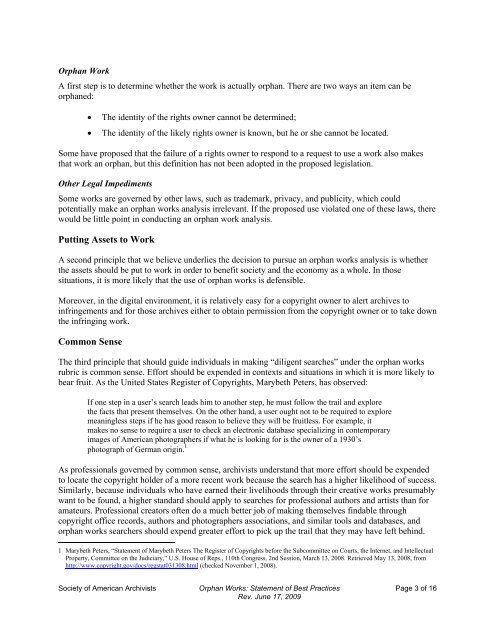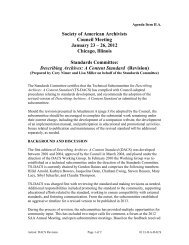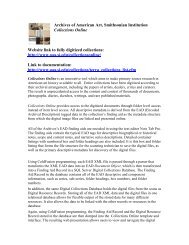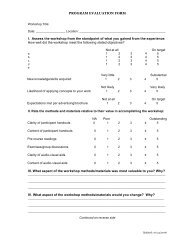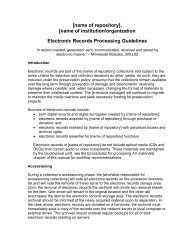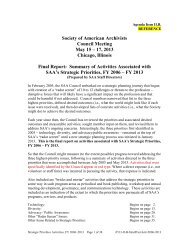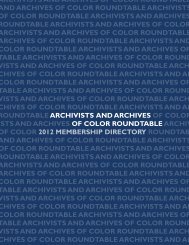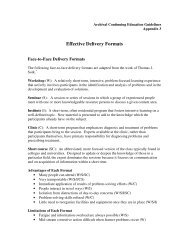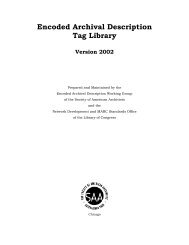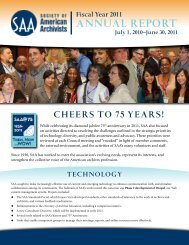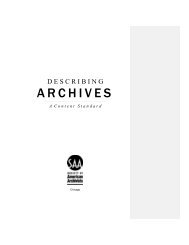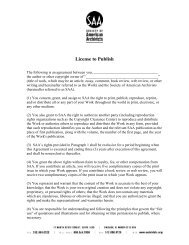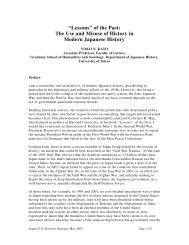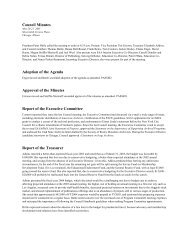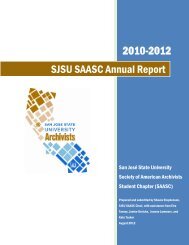Society of American Archivists - US Copyright Office
Society of American Archivists - US Copyright Office
Society of American Archivists - US Copyright Office
You also want an ePaper? Increase the reach of your titles
YUMPU automatically turns print PDFs into web optimized ePapers that Google loves.
Orphan WorkA first step is to determine whether the work is actually orphan. There are two ways an item can beorphaned:The identity <strong>of</strong> the rights owner cannot be determined;The identity <strong>of</strong> the likely rights owner is known, but he or she cannot be located.Some have proposed that the failure <strong>of</strong> a rights owner to respond to a request to use a work also makesthat work an orphan, but this definition has not been adopted in the proposed legislation.Other Legal ImpedimentsSome works are governed by other laws, such as trademark, privacy, and publicity, which couldpotentially make an orphan works analysis irrelevant. If the proposed use violated one <strong>of</strong> these laws, therewould be little point in conducting an orphan work analysis.Putting Assets to WorkA second principle that we believe underlies the decision to pursue an orphan works analysis is whetherthe assets should be put to work in order to benefit society and the economy as a whole. In thosesituations, it is more likely that the use <strong>of</strong> orphan works is defensible.Moreover, in the digital environment, it is relatively easy for a copyright owner to alert archives toinfringements and for those archives either to obtain permission from the copyright owner or to take downthe infringing work.Common SenseThe third principle that should guide individuals in making “diligent searches” under the orphan worksrubric is common sense. Effort should be expended in contexts and situations in which it is more likely tobear fruit. As the United States Register <strong>of</strong> <strong>Copyright</strong>s, Marybeth Peters, has observed:If one step in a user’s search leads him to another step, he must follow the trail and explorethe facts that present themselves. On the other hand, a user ought not to be required to exploremeaningless steps if he has good reason to believe they will be fruitless. For example, itmakes no sense to require a user to check an electronic database specializing in contemporaryimages <strong>of</strong> <strong>American</strong> photographers if what he is looking for is the owner <strong>of</strong> a 1930’sphotograph <strong>of</strong> German origin. 1As pr<strong>of</strong>essionals governed by common sense, archivists understand that more effort should be expendedto locate the copyright holder <strong>of</strong> a more recent work because the search has a higher likelihood <strong>of</strong> success.Similarly, because individuals who have earned their livelihoods through their creative works presumablywant to be found, a higher standard should apply to searches for pr<strong>of</strong>essional authors and artists than foramateurs. Pr<strong>of</strong>essional creators <strong>of</strong>ten do a much better job <strong>of</strong> making themselves findable throughcopyright <strong>of</strong>fice records, authors and photographers associations, and similar tools and databases, andorphan works searchers should expend greater effort to pick up the trail that they may have left behind.1 Marybeth Peters, “Statement <strong>of</strong> Marybeth Peters The Register <strong>of</strong> <strong>Copyright</strong>s before the Subcommittee on Courts, the Internet, and IntellectualProperty, Committee on the Judiciary,” U.S. House <strong>of</strong> Reps., 110th Congress, 2nd Session, March 13, 2008. Retrieved May 13, 2008, fromhttp://www.copyright.gov/docs/regstat031308.html (checked November 1, 2008).<strong>Society</strong> <strong>of</strong> <strong>American</strong> <strong>Archivists</strong> Orphan Works: Statement <strong>of</strong> Best Practices Page 3 <strong>of</strong> 16Rev. June 17, 2009


